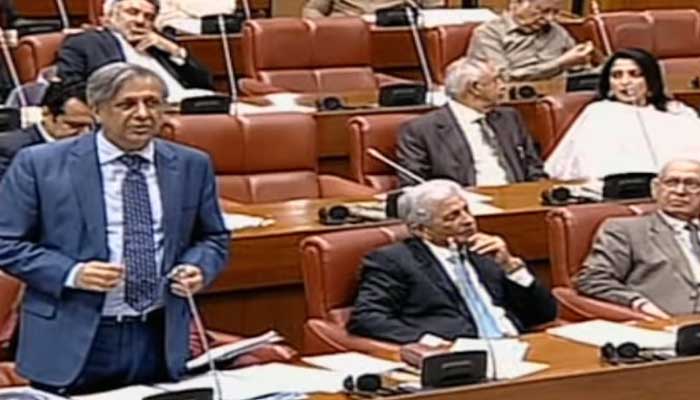Senate okays election amendment bill to 'circumvent' SC ruling on reserved seats
PTI senators strongly oppose amendment bill tabled by PML-N lawmaker
ISLAMABAD: The bill seeking to 'circumvent' the Supreme Court's ruling on reserved seats sailed through the Senate as well, hours after it was passed by the National Assembly earlier today (Tuesday).
Pakistan Muslim League-Nawaz (PML-N) Senator Talal Chaudhry presented the Election Act (Amendment) Bill, 2024, in the upper house amid strong opposition from the Pakistan Tehreek-e-Insaf (PTI) lawmakers.
The NA earlier in the day approved a bill proposing amendments to the Elections Act 2017 to bar lawmakers from changing their party affiliation amid strong resistance from opposition benches who termed the legislation "unconstitutional".
Tabled by PML-N lawmaker Bilal Azhar Kiyani last month, the NA Parliamentary Affairs Committee approved the bill with the support of eight members, four members opposed it, and Shahid Akhtar, a Jamiat Ulema-e-Islam (JUI-F) MNA, abstained from voting.
The Senate witnessed hooliganism from the PTI senators as Chaudhary presented the bill to 'circumvent' the Supreme Court's ruling on reserved seats that favours the opposition party.
The apex court on July 21 declared PTI a political party and eligible for reserved seats, which paved the way for the Imran Khan-founded party's return to the parliament but also effectively deprived the PML-N led coalition government of its two-thirds majority in the parliament.
Bill tabled in bad faith against PTI
Senator Shibli Faraz, while addressing the Senate, sharply criticised the Election Commission of Pakistan (ECP), stating that "the electoral body is known as the 'selection commission' rather than the 'election commission'."
"The Election Commission declared our [PTI] intra-party polls null and void and stripped us of our electoral symbol. We were assigned absurd election symbols, such as a shoe, which landed on their [government's] head," he said.
According to Senator Faraz, the bill was tabled in bad faith to prevent implementation of the verdict given by a majority of the apex court's judges.
Calling it a direct attack on the Supreme Court, Faraz asserted that “the PTI opposes the bill as it deprives the party of its mandate”.
Authority to make laws rests solely with Parliament
At this, Federal Minister for Law Azam Nazeer Tarar said that this bill was drafted before the apex court's verdict and aimed at further interpretation.
"The authority to make laws rests solely with Parliament and this power would not be delegated to a group of 17 individuals, as Parliament was determined to exercise its authority," he said adding, “The bill was introduced to provide needed clarification and enhance the electoral process."
Stressing that amending laws was a parliamentary right, not one to be claimed by any other institution, Tarar said there was a clear distinction between interpreting and rewriting the Constitution.
The legislation, once it comes into effect following the approval from the Senate and the president's assent, will prevent the individuals who contested the general election as independent candidates from changing their affidavit at a later stage to declare affiliation with any political party.
The bill, when it becomes a law, might reverse the PTI's return to the parliament after its "resurrection" in the assemblies following the July 12 ruling.
Since then, the ECP has notified as many as 93 lawmakers from three provincial legislatures as PTI members.
The electoral body issued a notification of 29 members of the PTI from Punjab, 58 from Khyber-Pakhtunkhwa and six from Sindh.
Meanwhile, 39 lawmakers in the NA, who had shown their affiliation with the PTI in their nomination papers, have also been declared by the ECP as PTI members.
What does the legislation say?
The legislation provisions retrospective effect and will apply from the commencement of the Elections Act 2017.
In its amendment to Section 66 of the Elections Act, the bill says that if a candidate does not submit a declaration of his affiliation with a political party to the returning officer (RO) before seeking allotment of the election symbol, they shall be "deemed to be considered as an independent candidate and not a candidate of any political party".
Meanwhile, the amendment to Section 104 reads that if a political party fails to submit its list for reserved seats within the prescribed time period, it will not be eligible for reserved seats at any later stage.
Furthermore, it adds a new provision to the original legislation titled Section 104A which declares the consent or affidavit of an independent candidate regarding joining a political party "irrevocable" and prohibits its withdrawal and substitution.
The legislation argues that "neither the Constitution nor the Elections Act, 2017 provides for joining a political party by an independent returned candidate or candidates at a subsequent stage when they have already exercised the option to join the political party at a point in time as specified in the Constitution".
-
Security forces gun down 30 terrorists in multiple IBOs in KP: ISPR
-
MQM-P calls for new province in Sindh
-
US report validates Pakistan military edge over India: PM
-
Banned TTP poses serious threat to Pakistan security: UNSC panel
-
CM Afridi clarifies remarks on by-poll after ECP requests army deployment
-
Dubai sees 3.2m Pakistani passengers in 2025 as airport sets new milestone
-
Security forces kill 23 Indian proxy terrorists in KP's Kurram
-
Pakistan to construct island to boost oil exploration: report












